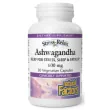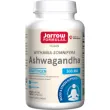The Science Behind Timing: Unveiling the Ideal Moment to Take Ashwagandha

Key Takeaways
Optimal times for Ashwagandha intake:- Morning Use: Can enhance energy and mental clarity.
- Evening Use: Promotes relaxation and improves sleep quality.
- Personal Health Needs: Timing should align with individual health goals and routines.
- Form of Supplement: Capsules, powders, or gummies may influence the best intake time.
Article by Arnie Gitomer Jan 15, 2024
Ashwagandha, an ancient Ayurvedic herb, has gained immense popularity in recent years for its potential health benefits. From reducing stress and anxiety to promoting sleep quality and boosting physical performance, the list of benefits associated with this adaptogenic herb is endless. However, what most people are unaware of is that the timing of consumption can play a crucial role in determining the efficacy of this supplement. In this blog post, we will delve into the science behind Ashwagandha and its potential benefits for overall health. We will also decode the best time to consume it and discuss various factors that can influence the timing of intake. Additionally, we will provide dosage guidelines and safety precautions along with answering some frequently asked queries about Ashwagandha timing. If you are considering incorporating Ashwagandha into your daily routine or simply curious about its ideal consumption time, this comprehensive guide will help you make an informed decision.
Understanding Ashwagandha: An Overview
Ashwagandha, also known as Indian ginseng, is an adaptogenic herb renowned for its stress-relieving properties and overall wellness promotion. Its cortisol-balancing ability makes it a popular choice for chronic stress management. Scientific research validates its potential in enhancing vitality and mental health, making it a valuable supplement. The adaptogen is available in various forms like ashwagandha powder, root extract, capsules, and root, each with specific benefits. While it offers numerous advantages, it's crucial to consider potential side effects like upset stomach and diarrhea, ensuring the best results without negative effects.
The Origin and Uses of Ashwagandha
Withania somnifera, commonly known as ashwagandha, is a small, woody shrub indigenous to India, the Middle East, and some parts of Africa. Its traditional applications include enhancing energy levels, regulating blood sugar, and maintaining hormonal equilibrium. This adaptogenic herb is celebrated for its ability to support the body's natural response to stressors. Typically consumed as ashwagandha root extract in capsules or blended into powder form, it has been a cornerstone of Ayurvedic medicine for many centuries, offering a holistic approach to addressing various health issues.
The Science Behind the Efficacy of Ashwagandha
Ashwagandha supplementation has been associated with enhancing sleep quality, particularly in individuals with insomnia. Scientific studies indicate its potential to reduce cortisol levels, the body's primary stress hormone. Evidence suggests that ashwagandha supports energy levels, stress management, and mental well-being in healthy adults. The adaptogenic properties of ashwagandha contribute to maintaining hormonal balance and overall wellness. Research highlights its potential in mitigating the effects of chronic stress. These findings underscore the significance of ashwagandha root extract in promoting overall health and well-being.
Unraveling the Benefits of Ashwagandha
The adaptogenic properties of ashwagandha make it an ideal supplement for managing stress and anxiety, promoting sleep quality, aiding in relaxation, and overall wellness. Those taking ashwagandha may experience improvements in physical performance, endurance, and immune system health due to its immune-modulating effects. Additionally, ashwagandha supports mental clarity, vitality, and overall health. These benefits make ashwagandha powder or ashwagandha root extract a favorable choice for individuals seeking the best results in managing stress, improving sleep, and boosting overall health.
Impact on Stress and Anxiety
Ashwagandha, also known as winter cherry, is renowned for its stress-relieving properties. It aids in managing everyday stressors and may reduce symptoms of anxiety and stress-related disorders, as indicated by research. The adaptogenic nature of ashwagandha helps regulate cortisol levels, mitigating the effects of chronic stress and promoting a more balanced stress response. This, in turn, contributes to mental wellness. The efficacy of ashwagandha in stress management makes it a valuable addition to wellness routines, offering the best results when used consistently in appropriate dosages. Users can opt for ashwagandha powder, root extract, or capsules for healthy responses without negative side effects
Role in Promoting Sleep Quality
Playing a crucial role in promoting sleep quality, ashwagandha has been associated with potential improvements for individuals struggling with insomnia. Its calming effects are believed to support relaxation, contributing to better sleep patterns and overall restfulness. Research suggests that ashwagandha supplementation can positively impact both sleep duration and the time it takes to fall asleep. By incorporating ashwagandha into wellness routines, individuals may experience rejuvenating sleep, thanks to its adaptogenic properties. This natural option offers the potential to promote not only sleep quality but also overall wellness, making it a valuable addition to one's daily regimen.
Potential Benefits for Physical Performance
Athletes and fitness enthusiasts can harness the adaptogenic properties of ashwagandha to aid in recovery while enhancing strength and power. Studies indicate that ashwagandha supplementation may contribute to improvements in physical performance, endurance, and vitality. Its popularity among active individuals stems from its potential to optimize physical resilience and aid in muscle recovery. Incorporating ashwagandha into wellness routines is a holistic approach to supporting overall physical performance. The benefits of ashwagandha powder and root extract make it a valuable addition to nutrition and health regimens, optimizing physical resilience and performance.
Effects on Immune System Health
Ashwagandha supplementation's immune-modulating effects support overall immune system health. Research indicates its potential in enhancing immune response and resilience, contributing to immune balance and vitality. Incorporating ashwagandha into wellness routines may benefit those seeking to support immune system health and overall vitality. The adaptogenic properties of ashwagandha make it a natural choice for promoting immune system health. With potential benefits extending to immune system health, ashwagandha root extract offers a holistic approach to wellness, addressing the body's immune needs effectively.
Decoding the Best Time to Consume Ashwagandha
Understanding the optimal timing for consuming ashwagandha is crucial in maximizing its potential benefits. Morning intake may enhance energy levels, mental clarity, and aid in stress relief, while evening consumption can promote relaxation and improve sleep quality. The timing of ashwagandha intake can significantly influence its effects on stress hormone levels and overall wellness. By deciphering the best time to consume ashwagandha supplements, individuals can harness its adaptogenic properties for stress relief and vitality, optimizing the potential benefits offered by ashwagandha powder or root extract.
Morning Intake vs Evening Intake: A Comparative Analysis
Comparing the effects of morning and evening intake of ashwagandha supplements provides valuable insights for optimizing its adaptogenic properties. Consuming ashwagandha in the morning can enhance mental focus, vitality, and stress management throughout the day. On the other hand, evening intake may promote relaxation, improve sleep quality, and induce a sense of calm. The timing of ashwagandha consumption directly influences its impact on cortisol levels and stress response, offering individuals the opportunity to integrate it into their daily wellness routines strategically. Understanding the comparative effects of morning and evening intake guides individuals in making informed decisions about incorporating ashwagandha into their daily routines.
The Science Behind the Ideal Timing
Optimizing ashwagandha supplementation involves understanding the circadian rhythm. The natural daily cycle of the stress hormone cortisol impacts its effectiveness. Research suggests nighttime intake may improve sleep quality and stress response while timing it with meals can affect absorption and efficacy. Individual cortisol levels determine the best time for consumption. Incorporating ashwagandha root extract into the daily routine requires consideration of lifestyle, health concerns, and the supplement form. This comprehensive approach ensures the best results and minimizes negative side effects, optimizing the benefits of ashwagandha powder.
Factors Influencing the Timing of Ashwagandha Intake
Personal schedules, stress levels, and energy play a crucial role in determining the optimal time for ashwagandha consumption. Regulating blood sugar levels may also impact the timing of ashwagandha supplementation. Ashwagandha's adaptogenic properties make it effective at various times of the day while aligning intake with chronic stress patterns can enhance its effectiveness. Furthermore, the form of the ashwagandha supplement influences its consistent effects throughout the day. These factors should be considered to maximize the benefits of ashwagandha powder or ashwagandha root extract, without experiencing negative side effects or upset stomach.
Lifestyle and Personal Routine
Incorporating ashwagandha into daily routines can enhance stress relief benefits. The right time for ashwagandha intake varies based on individual schedules. Aligning intake with stressors can optimize adaptogenic benefits, and timing it with dietary supplements can support mental health and hormonal balance. Additionally, ashwagandha can be timed with moon milk or smoothies for maximum effects. Considering personal routine, stress patterns, and energy levels is crucial when determining the best time of day to take ashwagandha. This optimization ensures that individuals receive the best results from ashwagandha supplementation.
Specific Health Concerns
Optimizing the timing of ashwagandha intake can address specific health concerns. For individuals with insomnia, evening supplementation may be beneficial. The effects of ashwagandha on blood sugar levels also influence the timing, impacting its efficacy. Adapting intake to cortisol levels can effectively address diverse health concerns, mitigating the hormonal impact of stress. Timely supplementation supports healthy cortisol levels and energy balance, enhancing its overall effectiveness. Understanding the connection between timing and specific health concerns is crucial for achieving the best results with ashwagandha supplementation.
The Form of Ashwagandha Supplement
When incorporating ashwagandha gummies into daily routines, individuals gain convenient timing options. Additionally, the capsule form allows for consistent ashwagandha intake, optimizing stress relief effects. The adaptogenic properties of ashwagandha extract support its efficacy at different times of day, ensuring the best results. Whether in smoothie or capsule form, ashwagandha supplements provide steady and consistent stress relief. Moreover, ashwagandha extract can be timed with other dietary supplements, amplifying the overall wellness benefits. This versatility makes ashwagandha a valuable addition to daily nutrition and wellness routines.
How to Incorporate Ashwagandha into Your Daily Routine
Incorporating ashwagandha into your daily routine requires adherence to dosage guidelines for safe and effective supplementation. Understanding the combined effects of ashwagandha with other supplements is crucial for the best results. To alleviate potential stomach discomfort, consider taking ashwagandha with a small snack. The best time of day for ashwagandha intake may vary based on individual health needs. Familiarizing yourself with ashwagandha's adaptogen properties is essential to optimize its stress relief benefits. By incorporating these practices, you can make the most of ashwagandha powder or capsules within your daily nutrition and wellness axis.
Dosage Guidelines and Safety Precautions
When incorporating ashwagandha into your routine, consider pairing it with meals to potentially alleviate stomach discomfort. Understanding the combined effects when pairing with other supplements is essential. A small snack can also help alleviate potential stomach discomfort. The best time to take ashwagandha varies based on individual cortisol levels, optimizing its stress relief benefits. Additionally, familiarizing yourself with ashwagandha's adaptogen properties can further enhance its efficacy for stress relief. By following these dosage guidelines and safety precautions, you can ensure a safe and effective experience with ashwagandha supplementation.
Ways to Pair Ashwagandha with Other Supplements
To optimize the benefits of ashwagandha, consider pairing it with a small snack to alleviate potential stomach discomfort. Understanding the combined effects of ashwagandha with other supplements is crucial for achieving the best results. Additionally, the ideal timing for ashwagandha intake depends on individual cortisol levels, maximizing its stress relief benefits. Familiarizing yourself with ashwagandha's adaptogen properties can further enhance its efficacy when paired with other supplements.
Frequently Asked Queries about Ashwagandha Timing
Understanding the impact of ashwagandha supplements on sleep quality remains crucial. The ideal timing for ashwagandha intake can vary based on individual health requirements. Timely supplementation can promote healthy cortisol levels and energy balance. Combining ashwagandha with a small snack may help alleviate potential stomach discomfort. Determining the best time to take ashwagandha depends on individual cortisol levels, ensuring optimal efficacy.
Can Ashwagandha Be Taken on an Empty Stomach?
Taking ashwagandha with a small snack can help prevent potential stomach discomfort. It's important to consider the combined effects when pairing it with other supplements. Understanding ashwagandha's adaptogen properties can optimize its stress relief benefits. Timing the supplementation supports healthy cortisol levels and energy balance, which varies depending on individual levels.
Is It Safe to Take Ashwagandha Before Bedtime?
Taking ashwagandha before bedtime can potentially promote relaxation and improve sleep quality. Some research suggests that it may have calming properties, making it suitable for evening use. Consulting with a healthcare professional is advised to determine the best time to take ashwagandha.
Can Ashwagandha Be Taken with Other Medications?
Consultation with a healthcare provider is crucial before combining ashwagandha with other medications. Understanding potential interactions is essential for safety. Research about ashwagandha's effects on specific medications can provide valuable insights. Seek personalized guidance from healthcare professionals to ensure overall wellness.
Making an Informed Decision: Choosing the Right Ashwagandha Supplement
When selecting an ashwagandha supplement, several factors come into play. The ashwagandha dosage, potency, and consistency are critical considerations. Additionally, the quality of the ashwagandha extract and the form in which it is consumed, such as capsules, play a vital role in determining the supplement's effectiveness. Understanding the adaptogenic properties of ashwagandha is crucial for making informed choices. Moreover, the decision between ashwagandha gummies, capsules, or extracts can significantly impact the selection process. Researching the best time of day to take ashwagandha supplements can also provide valuable guidance for making an informed decision.
Factors to Consider When Choosing an Ashwagandha Supplement
When selecting an ashwagandha supplement, evaluating its adaptogenic benefits is crucial. Understanding the impact on hormonal balance and stress response informs decision-making. Quality, consistency, and potency are key considerations, influencing the supplement's effectiveness. Additionally, comprehending the benefits of ashwagandha supplementation guides informed choices. These factors play a vital role in determining the most suitable ashwagandha supplement to achieve the best results. Consider ashwagandha powder or root extract for optimal nutrition and minimal negative side effects. Researching the ideal ashwagandha capsules or root form can help avoid an upset stomach.
Does the Timing Matter in Determining the Efficacy of the Supplement?
Understanding the influence of timing on the efficacy of ashwagandha is crucial. Research suggests that aligning supplementation with the body's natural stress response can enhance its effectiveness. By exploring ashwagandha's impact at different times of day, we can optimize its adaptogenic properties.
Conclusion
In conclusion, the ideal time to take Ashwagandha depends on several factors such as your lifestyle, specific health concerns, and the form of the supplement. While some people prefer taking it in the morning to boost energy and promote mental clarity throughout the day, others find evening intake more beneficial for its calming effects on stress and sleep quality. It is important to consider your personal routine and consult with a healthcare professional to determine the best timing for your needs. Remember to follow dosage guidelines and safety precautions when incorporating Ashwagandha into your daily routine. Lastly, choose a reputable and high-quality Ashwagandha supplement to ensure maximum efficacy.
 |
Read more about Arnie Gitomer |
Product Search Results

|
Ashwagandha 600 mg Sensoril | Natural Factors | $15.16 | 52930 |

|
Ashwagandha Ext 300 mg | Jarrow Formulas | Login for Willner pricing. $26.99 | 50091 |

|
Ashwagandha Ext 500 mg | Pure Encapsulations | Login for Willner pricing. $26.20 | 50895 |

|
Ashwagandha Root 1:1.5 | Willner Phyto Tech | $12.08 | 57008 |

|
Ashwagandha Root 1:1.5 | Willner Phyto Tech | $22.25 | 58091 |

|
Ashwagandha vCap | Willner Phyto Tech | $18.11 | 67463 |
